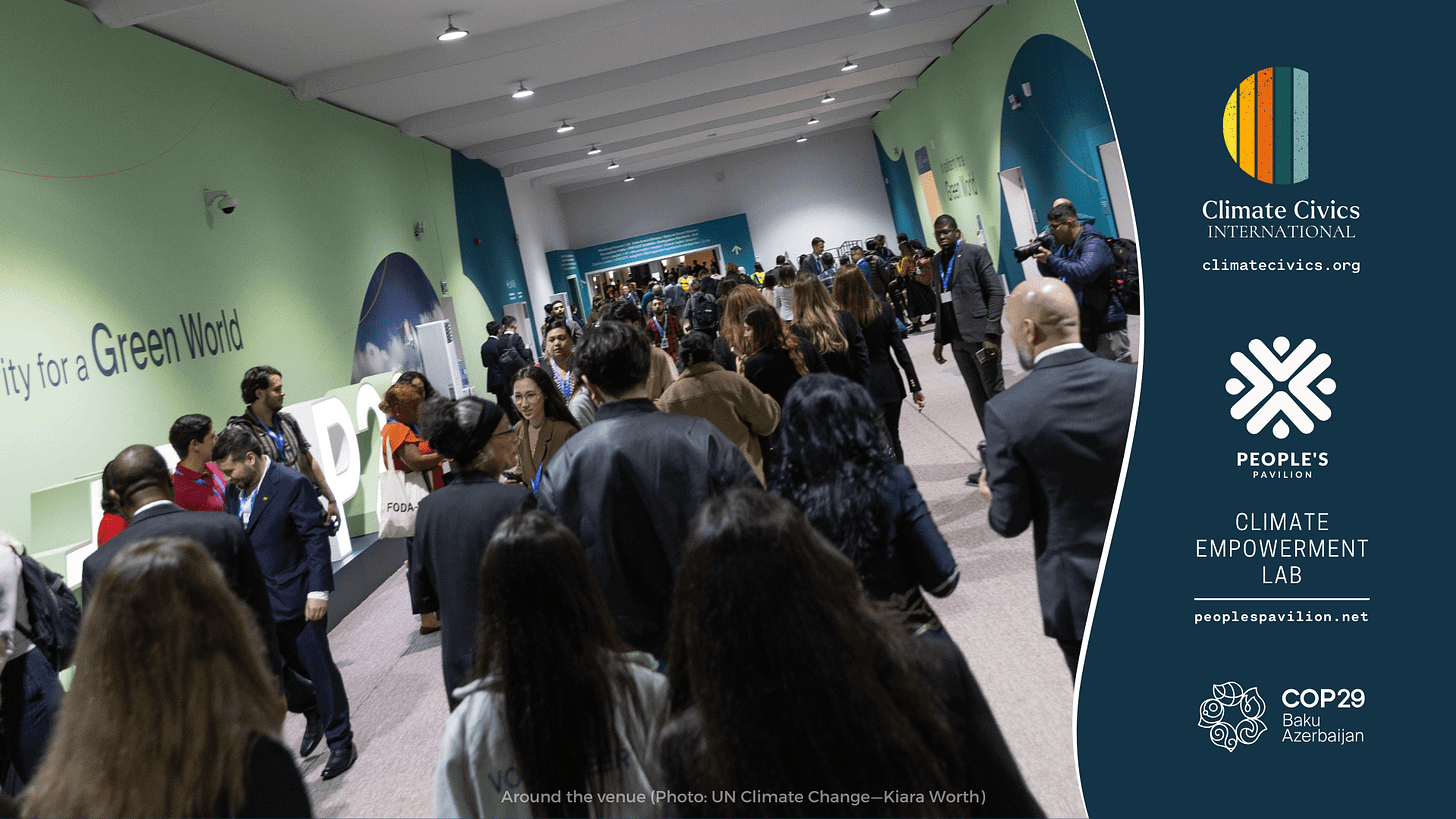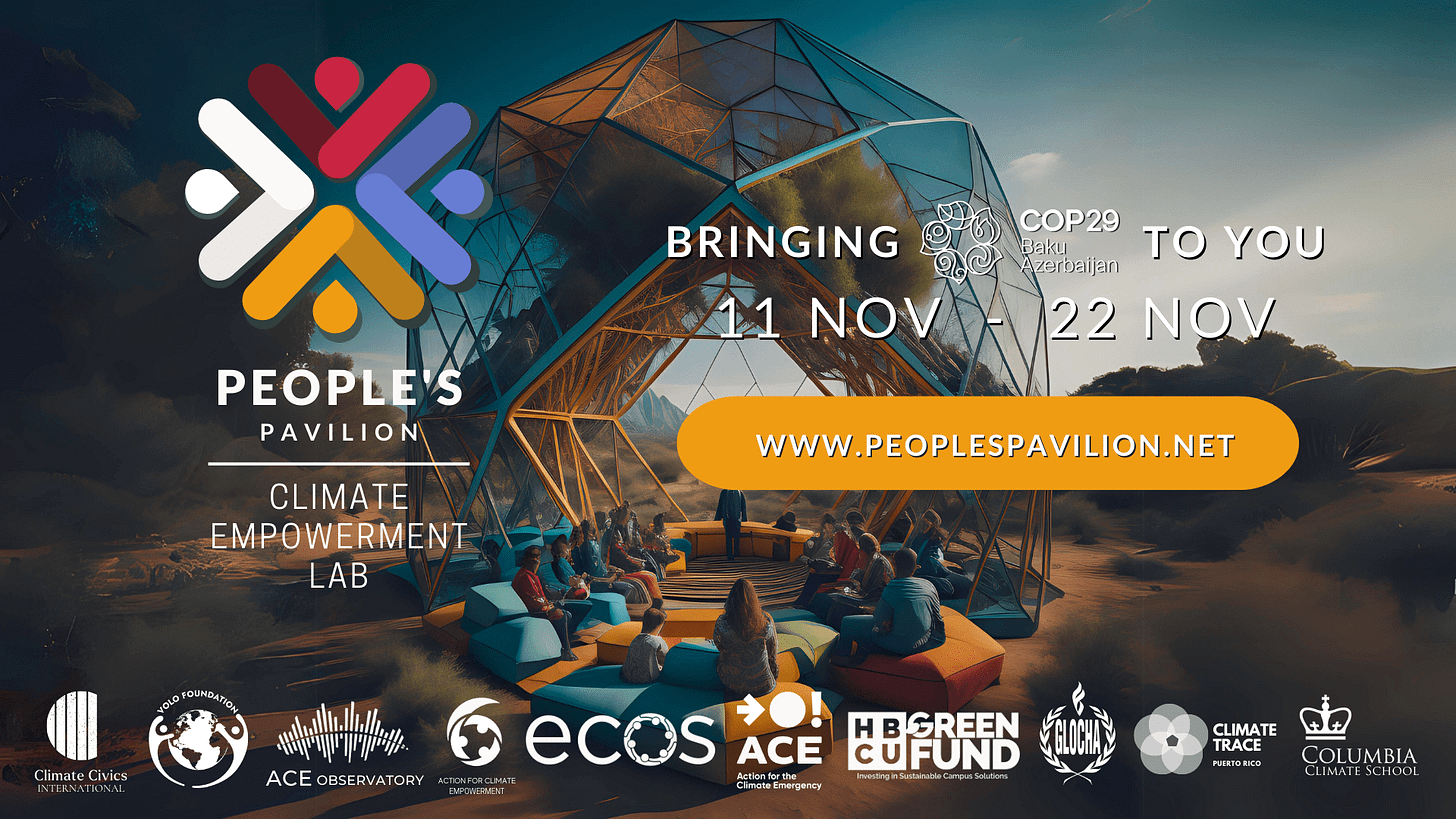The foundations of future peace, prosperity & wellbeing
The Paris Agreement points to a future of reduced risk & improved outcomes for all. Can the COP29 agree to take us there?
The Paris Agreement is focused on international cooperative response to industrial disruption of Earth’s climate system. It is also, however, a blueprint for emergence of a new sustainable economy—fit for the challenge of achieving climate-resilient development as an everyday condition. Success in this effort will mean a world less prone to conflict, more open to shared prosperity, and better able to enhance human wellbeing locally and globally.

Here, we take a look at a few ingredients of this cooperative crisis response, and then map out the benefits of successful engagement from all sides.
Article 13 of the Paris Agreement focuses on establishment of an Enhanced Transparency Framework, the purpose of which is:
to provide a clear understanding of climate change action in the light of the objective of the Convention as set out in its Article 2 [prevent dangerous climate change], including clarity and tracking of progress towards achieving Parties’ individual nationally determined contributions under Article 4, and Parties’ adaptation actions under Article 7, including good practices, priorities, needs and gaps, to inform the global stocktake under Article 14.
Article 2 of the United Nations Framework Convention on Climate Change (the Convention) reads:
The ultimate objective of this Convention and any related legal instruments that the Conference of the Parties may adopt is to achieve, in accordance with the relevant provisions of the Convention, stabilization of greenhouse gas concentrations in the atmosphere at a level that would prevent dangerous anthropogenic interference with the climate system. Such a level should be achieved within a time-frame sufficient to allow ecosystems to adapt naturally to climate change, to ensure that food production is not threatened and to enable economic development to proceed in a sustainable manner.
This matters, because the Convention not only set a globally agreed mandate to “prevent dangerous anthropogenic interference with the climate system”; it also specified in language agreed as international law that this would need to be done by reducing global heating emissions, while providing for the health and resilience of ecosystems and for sustainable development.
32 years after the Convention was agreed, we find ourselves in a world of worsening dangerous climate disruption, which threatens food systems, triggers local and regional mass migration and conflict, and now imposes major costs on all societies measurable in whole percentages of national economic output.
The 2023 State of the Climate report contained this haunting warning:
By the end of this century, an estimated 3 to 6 billion individuals — approximately one-third to one-half of the global population — might find themselves confined beyond the livable region, encountering severe heat, limited food availability, and elevated mortality rates because of the effects of climate change (Lenton et al. 2023).
As highlighted in our COP29 agenda brief:
Estimates of the costs of unchecked climate change from now to 2070 range from $178 trillion to $700 trillion; no nation can afford to let climate-disrupting fuels be the engine of mainstream economic activity for decades to come. The fiscal stability outlook is becoming bleak. The Commodity Futures Trading Commission, the Fiscal Stability Oversight Council, a global coalition of central banks, and the Financial Stability Board, all agree: unchecked climate change will eventually collapse financial systems and could destabilize even the wealthiest nations.
The raw math of the climate challenge, including the long delay in reducing global emissions, means one thing above all:
Climate risk reduction is not a political question; it is an operational imperative, for all nations.
It is worth taking a closer look at how the Paris Agreement process can provide for better health, opportunity, wellbeing, and security.
By inviting all nations to participate in a global race to successful climate-resilient development (Article 4), it makes it easier for any nation to experience reduced climate danger—in principle (action must follow).
Article 2.1(c) calls for aligning all financial flows with the goal of limiting global heating to 1.5ºC, which was confirmed by the 2018 IPCC report to be the threshold for intolerably costly climate danger.
Article 7.1 calls for reducing harm from climate-related causes, and fostering adaptation and resilience measures that make it possible for human societies and natural ecosystems to recover and thrive.
Article 6.8 outlines standards for international cooperative measures to accelerate overall progress and mainstream climate-smart practices at home and abroad.
Article 12 provides for all of society to be engaged in understanding, planning, innovating, and responding to climate-related risks and opportunities for innovation.
In the global consensus decision adopting the Paris Agreement, 196 nations “[recognized] that climate change represents an urgent and potentially irreversible threat to human societies and the planet and thus requires the widest possible cooperation by all countries, and their participation in an effective and appropriate international response, with a view to accelerating the reduction of global greenhouse gas emissions”.
The decision also “[acknowledged] that climate change is a common concern of humankind” and called on all nations to:
respect, promote and consider their respective obligations on human rights, the right to health, the rights of indigenous peoples, local communities, migrants, children, persons with disabilities and people in vulnerable situations and the right to development, as well as gender equality, empowerment of women and intergenerational equity.
Each of these words matters, because they all point to a core mission founded on high ambition, ethical and accountable action, and consideration of the rights and needs of all. Where skeptics and critics worry that international climate policy decisions could disadvantage their community or their industry, this should be meaningful. The best response would be to get engaged and to contribute constructively to a climate-smart future for your community or your business or industry.
From the perspective of Climate Civics International, the benefits of a negotiated transition away from fossil fuels would include:
An unprecedented expansion of investment in climate-smart practices, and related innovations;
A shift to climate-smart trade, supported by multilateral cooperative arrangements and innovative financing mechanisms;
More resources flowing to local benefits to people and enterprise, including better access to sustainably produced, health-building food;
Reduced likelihood of price shocks related to degradation of ecosystems and watersheds that support agriculture;
Reduced likelihood of price shocks from commodity-based fossil energy;
Expanded emphasis on the economic efficiencies inherent in communities that enjoy better health, reduced risk, and fewer price shocks;
All leading to more rational fiscal or public funding structures and sustainable budgets—meaning better sustained investment in services that all people benefit from, like education and infrastructure.
Being aware of what people live and dream, in many diverse circumstances around the world, and also in diverse circumstances within countries, we are able to see how a cooperative sprint to better practices produces these everyday benefits. Including stakeholders’ voices is a shortcut to clarity about the human impact of high-level decisions and major new allocations of capital.
This is also a good time to reflect on two critical insights that are naturally converging this week in Baku, even if many political leaders would like to pretend otherwise:
As well reported in Grist: “Everyone at the COP29 climate summit agrees that the world’s poorest and most climate-vulnerable countries need trillions of dollars to transition to clean energy and cope with climate-fueled disasters.”
As noted in the Pre-COP29 Earth Diplomacy Leadership Report: Success depends on”negotiations and outcomes that leave behind zero-sum thinking (where if one wins the other loses), to provide multiple co-benefits all around.”
For too long, we have been held back by the narrow-minded view that a nation can serve its interests by doing no more than its share; the reality is, and has always been, that unless all national climate policy everywhere is perfect, at the same time, and with zero delays in action, that strategy will hurt us all.
So, as we move deeper into Week 2 of the COP29, CCI is calling on the Parties to the Paris Agreement to:
Remember the mandate—to prevent dangerous climate change, together;
Set collective ambition where it should be—zero harm to people and nature, with robust climate-resilient development being an engine for peace, prosperity, and wellbeing;
Develop innovative insight-sharing tools—not just for the UNFCCC process itself, but to allow mainstream decision-makers at all levels to operationalize climate resilience insights;
Embrace climate-smart trade—recognizing that some nations carry a greater ethical burden and no one should be punished financially for their vulnerability;
Improve benefits of next steps by linking them to mid-range prosperity goals and the right of future generations to exist in a safe and healthy (livable) world.
We hold up the following as examples of mechanisms that could serve these priorities well:
A global co-investment platform for food systems transformation, aligned with climate goals and focused on revitalizing and diversifying marginalized, under-resourced, and unsustainable rural economies;
Negotiated climate-smart trade agreements, aligned with the PARIS Principles and allowing each nation to reduce future dependence on polluting practices, while building a green economy;
The Climate Value Exchange, intended to serve as a cooperative insight-sharing and policy innovation platform, to support non-market cooperation that builds value locally and across whole economies;
Accelerated innovation timelines, including for integrated data systems aimed at providing real-time multidimensional performance tracking for mainstream investment activities;
A Fossil Fuel Non-Proliferation Treaty, or similar agreed cooperative framework for the needed transition away from fossil fuels in energy systems.
Despite the high stakes for all nations, many still take comfort in the falsehood that political calculations might justify a "wait and see" approach. It is too late for that. Future costs are intolerably high if we do nothing. As Simon Stiell—head of UN Climate Change—said yesterday in Baku, it's time to "cut the theatrics" and start shaping the best possible future for humankind.
Follow our COP29 activities and coverage at climatecivics.org
Engage in thematic discussions at peoplespavilion.net



